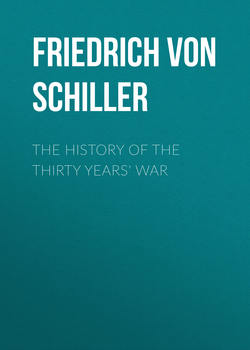The History of the Thirty Years' War

Реклама. ООО «ЛитРес», ИНН: 7719571260.
Оглавление
Friedrich von Schiller. The History of the Thirty Years' War
Preface
Book I
Book II
Book III
Book IV
Book V
Notes:
Отрывок из книги
From the beginning of the religious wars in Germany, to the peace of Munster, scarcely any thing great or remarkable occurred in the political world of Europe in which the Reformation had not an important share. All the events of this period, if they did not originate in, soon became mixed up with, the question of religion, and no state was either too great or too little to feel directly or indirectly more or less of its influence.
Against the reformed doctrine and its adherents, the House of Austria directed, almost exclusively, the whole of its immense political power. In France, the Reformation had enkindled a civil war which, under four stormy reigns, shook the kingdom to its foundations, brought foreign armies into the heart of the country, and for half a century rendered it the scene of the most mournful disorders. It was the Reformation, too, that rendered the Spanish yoke intolerable to the Flemings, and awakened in them both the desire and the courage to throw off its fetters, while it also principally furnished them with the means of their emancipation. And as to England, all the evils with which Philip the Second threatened Elizabeth, were mainly intended in revenge for her having taken his Protestant subjects under her protection, and placing herself at the head of a religious party which it was his aim and endeavour to extirpate. In Germany, the schisms in the church produced also a lasting political schism, which made that country for more than a century the theatre of confusion, but at the same time threw up a firm barrier against political oppression. It was, too, the Reformation principally that first drew the northern powers, Denmark and Sweden, into the political system of Europe; and while on the one hand the Protestant League was strengthened by their adhesion, it on the other was indispensable to their interests. States which hitherto scarcely concerned themselves with one another's existence, acquired through the Reformation an attractive centre of interest, and began to be united by new political sympathies. And as through its influence new relations sprang up between citizen and citizen, and between rulers and subjects, so also entire states were forced by it into new relative positions. Thus, by a strange course of events, religious disputes were the means of cementing a closer union among the nations of Europe.
.....
Such considerations clouded the mind of Henry at the close of his glorious career. What had it not cost him to reduce to order the troubled chaos into which France had been plunged by the tumult of civil war, fomented and supported by this very Austria! Every great mind labours for eternity; and what security had Henry for the endurance of that prosperity which he had gained for France, so long as Austria and Spain formed a single power, which did indeed lie exhausted for the present, but which required only one lucky chance to be speedily re-united, and to spring up again as formidable as ever. If he would bequeath to his successors a firmly established throne, and a durable prosperity to his subjects, this dangerous power must be for ever disarmed. This was the source of that irreconcileable enmity which Henry had sworn to the House of Austria, a hatred unextinguishable, ardent, and well-founded as that of Hannibal against the people of Romulus, but ennobled by a purer origin.
The other European powers had the same inducements to action as Henry, but all of them had not that enlightened policy, nor that disinterested courage to act upon the impulse. All men, without distinction, are allured by immediate advantages; great minds alone are excited by distant good. So long as wisdom in its projects calculates upon wisdom, or relies upon its own strength, it forms none but chimerical schemes, and runs a risk of making itself the laughter of the world; but it is certain of success, and may reckon upon aid and admiration when it finds a place in its intellectual plans for barbarism, rapacity, and superstition, and can render the selfish passions of mankind the executors of its purposes.
.....